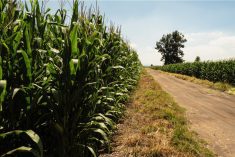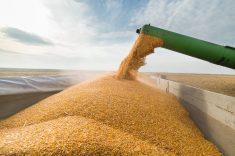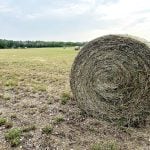A U.S. territory with an appetite for Canadian potatoes and no commercial potato production to speak of will be able to resume imports of table stock potatoes from Prince Edward Island starting Wednesday.
The resumption of exports to Puerto Rico, announced Tuesday, is a spot of good news for the province’s potato sector. Export certificates for P.E.I. potatoes to the U.S. and its territories have been suspended since November following confirmed cases of potato wart in two fields in that province.
Read Also

Alberta harvest wrapping up: report
Harvest operations advanced to 96 per cent complete in Alberta as of Oct. 7, with only a few late-seeded cereal and canola fields remaining, according to the latest provincial crop report.
Canada had agreed to suspend those certificates at the request of the U.S. Department of Agriculture, which on Nov. 22 instructed U.S. border officials to refuse entry to P.E.I. seed, table and processing potatoes.
According to Agriculture and Agri-Food Canada, the federal Plant Protection Regulations require that the Canadian Food Inspection Agency issue export certificates only if the requirements of the importing country are met.
Thus, the U.S. request in November upended a previously agreed-upon system, in place since 2001, allowing exports to the U.S. from lower-risk zones in the province where the fungus that causes potato wart hasn’t been detected and where the same equipment wasn’t used.
Before the findings in two fields in October, potato wart had appeared in 33 fields in P.E.I. since 2000.
For Puerto Rico, P.E.I. potatoes are “an important staple” given their quality and affordability, AAFC said in a release late Tuesday. The U.S. territory imported $12 million worth of P.E.I. table stock potatoes in 2020.
P.E.I. potato exports to Puerto Rico specifically pose a “negligible” risk for transmission of potato wart, AAFC said.
“After considering Puerto Rico’s low risk for potato wart due to climate conditions, as well as the lack of a commercial potato production industry on the island, we are confident that with appropriate mitigations in place this trade can resume safely, and the U.S. potato industry will remain protected,” U.S. Agriculture Secretary Tom Vilsack said in a separate release Tuesday.
USDA’s Animal and Plant Health Inspection Service (APHIS) is now working “expeditiously” on its analysis for resuming imports of P.E.I. table stock potatoes to the continental U.S., AAFC said Tuesday.
CFIA “continues to have regular technical discussions with APHIS to provide the necessary scientific data and information to resume trade,” AAFC said.
Meanwhile, “P.E.I.’s hard working farmers can finally feel some sense of relief knowing their high quality potatoes will start moving again for export,” federal Agriculture Minister Marie-Claude Bibeau said Tuesday.
The P.E.I. Potato Board, in a separate statement Tuesday, hailed the Puerto Rico announcement as “a first step in an urgent effort to reopen the U.S. border to our world-class potatoes.”
It will be “important to understand what the requirements are for resumption of trade with Puerto Rico,” the board said, and “it will also be critical to understand a clear timeline for resumption with the rest of the U.S.”
‘Not just about P.E.I.’
“With this positive news it confirms the approach our government took in responding to the border closure was the correct one to ensure long-term access to American markets based on science,” Robert Morrissey, MP for the P.E.I. riding of Egmont, said in the federal release.
CFIA has previously said that if it didn’t agree to suspend the export certificates in question, a separate U.S. federal order would prohibiting import of fresh potatoes from P.E.I. would have followed and would be “very challenging to overturn.”
Ottawa in December pledged up to $28 million to help P.E.I. potato producers manage the surplus of potatoes resulting from the U.S. export suspension.
A resulting program, which also includes $12.2 million in provincial funding, was formally launched earlier this month with the goal of “diverting as many potatoes as possible to processors, packers and food banks.”
Where needed, the program will also help P.E.I. potato growers cover the cost of “environmentally-sound destruction of surplus potatoes” at a rate of up to 8.5 cents per pound.
It’s estimated that about 290 million pounds of potatoes will be diverted to other processors, packers, dehydrators, food banks and other markets under the program, AAFC said — while another 300 million pounds, or about 10 per cent of the province’s total 2021 production, will need to be destroyed.
The board, in Tuesday’s statement, thanked Bibeau along with P.E.I. MP and Veterans Affairs Minister Lawrence MacAulay for their work to resolve the matter, which it said “inevitably is not just about P.E.I. or potatoes, but more broadly about Canadian agricultural trade with our largest customer — the U.S.” –– Glacier FarmMedia Network

















